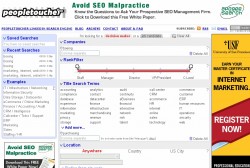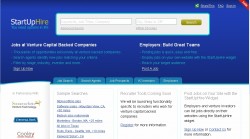Today we bring you PeopleToucher and a roundup of a few other interesting sites that have popped up on our radar. For recruiters, the most valuable one is the one with the, shall we say, memorable name.
Founder Chris Pomeroy is well aware of the snickers over his choice of names. “We know it has some connotations to it, but it just helps spread the word,” he says. And we think the word should spread fast, since this is a tool no hunter should be without.
 PeopleToucher vastly simplifies searching LinkedIn. That’s all it does. But it does it so well and so thoroughly that even if Pomeroy charged to use it, we’d recommend it. He’s very clear that his tool is not itself a search engine. Instead, “we just help users put together better searches and organize them for reuse.”
PeopleToucher vastly simplifies searching LinkedIn. That’s all it does. But it does it so well and so thoroughly that even if Pomeroy charged to use it, we’d recommend it. He’s very clear that his tool is not itself a search engine. Instead, “we just help users put together better searches and organize them for reuse.”
Considering that proviso, you’d think we would get the same results using LinkedIn’s search. We didn’t. A search for a manager, director or VP of purchasing at Boeing produced no results with the LinkedIn search tool. Using PeopleToucher, we came up with 10 listings.
There’s no good reason for such a wide difference in results. But we tried to replicate the PeopleToucher results on LinkedIn using a variety of combinations and just weren’t able to.
Even if you can — and no doubt, many of you are more proficient than we at using LinkedIn’s search — PeopleToucher is simpler and easier to use. “For starters,” says Pomeroy, “There’s simply not enough text input space available to type out a complex search and too many cumbersome drop-down menus.” Plus, like LinkedIn, you can save complex searches for repeat use.
One other feature we like: Pomeroy is very attentive to his audience. His blog has a tutorial; he answers questions and suggests workarounds for tricky problems.
Keep in mind that PeopleToucher, like LinkedIn itself, only reaches three degrees into your personal network. So the bigger your personal network, the more results. LinkedIn subscribers don’t have the same limitations.
 Recruiting for a startup? No easy task if you’re looking for experienced talent with a pedigree. (Well, it might be easier these days, but stay with us here.) To address that problem comes StartUpHire, itself a startup launched by a group of VC firms, bankers and others.
Recruiting for a startup? No easy task if you’re looking for experienced talent with a pedigree. (Well, it might be easier these days, but stay with us here.) To address that problem comes StartUpHire, itself a startup launched by a group of VC firms, bankers and others.
It launched in semi-stealth in January, and made its public beta announcement Wednesday. Officially, StartUpHire is a job board, though its restrained design and classic features give it an almost refined feel. Everything about the site suggests it means business when it says “Employer participation is restricted to venture capital backed companies which are privately held.”
The site has several nice touches, including the ability to search by investor or VC. A widget makes it possible for a VC to monitor all the jobs being offered by their firms and for a company to have its jobs listed on the company site, even if it doesn’t, yet, have a career center.
One other important point: It’s free for qualifying firms to post openings.
 If you are a regular ERE.net reader or a tech savvy recruiter (Oh, come on. You all aren’t) then you might have an inkling what’s happening at Twitter. Besides those tedious “I’m ordering a venti frappuccino” messages, Twitter is all a tweet with job messages.
If you are a regular ERE.net reader or a tech savvy recruiter (Oh, come on. You all aren’t) then you might have an inkling what’s happening at Twitter. Besides those tedious “I’m ordering a venti frappuccino” messages, Twitter is all a tweet with job messages.
We’ve written about JobAngels and TweetMyJobs, which between them are sending out thousands of job messages a day. There are hundreds, maybe more, Tweets coming from individual recruiters, company postings, employees, and who knows who else.
Making sense of this was Twitter’s own search engine. It’s fast, dependable enough, but returns jobs and anything else that happens to match your keywords. Then the clever Brits at Workhound came up with a job search for Twitter. Faster than you can Twitter for help you can search just jobs and get back just jobs. It’ll tell you where they’re from, as in CareerBuilder, or an agency or just folks. You can filter by when they were tweeted, where, and you can link directly to the job, assuming, as is usually, but not always, the case, that the original job listing link was included in the Twitter message.
As we searched through a variety of jobs, it became apparent that Twitter holds the promise of becoming a source of those unadvertised jobs usually filled by personal referral. We saw a tweet from a worker leaving a web job in Santa Monica linking to the company website and another from a worker who just gave notice.
For the jobseeker, this tool and Twitter have some interesting potential.